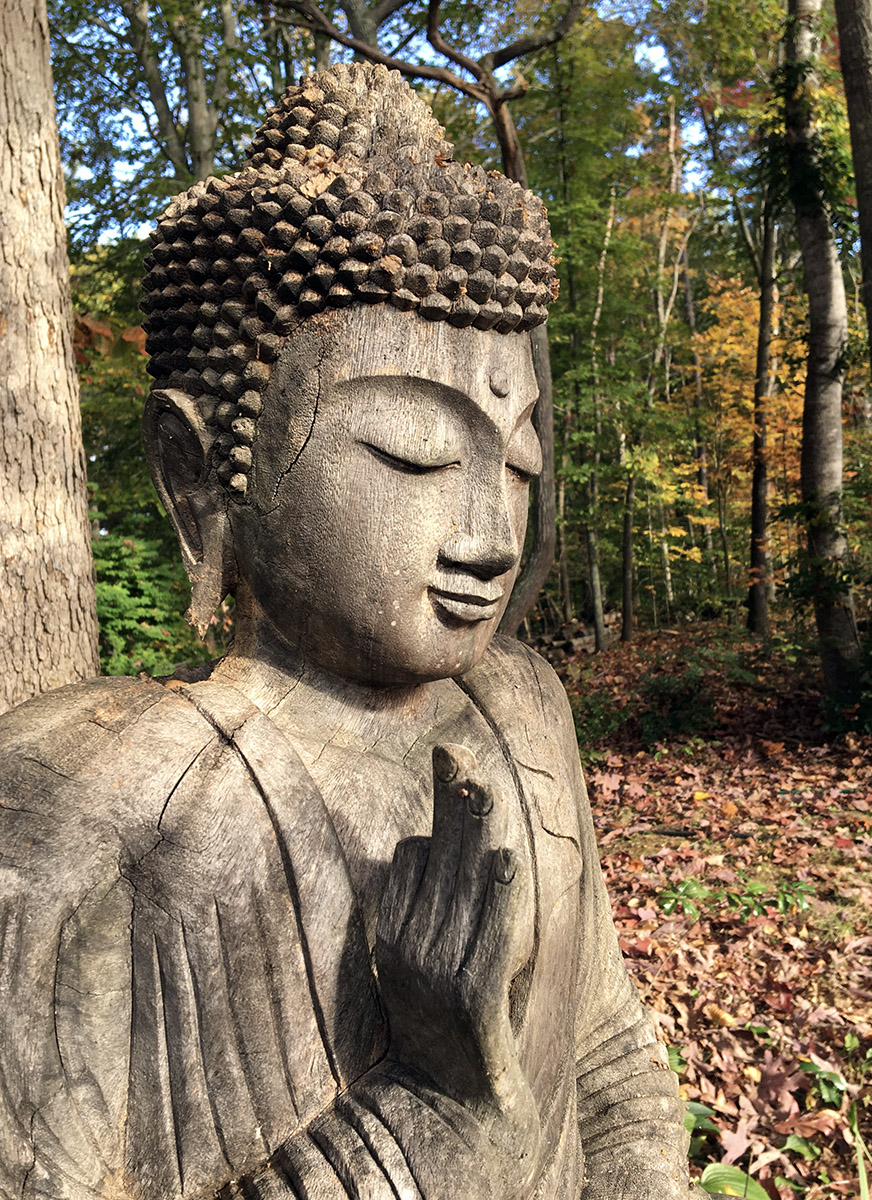By Sunya-roshi
In the U.S. we make a big deal out of Thanksgiving, our annual tribute to gratitude, football, and overeating. Don’t get me wrong – I love Thanksgiving, with its relative freedom from religious trappings and over-the-top consumerism. With its theme of gratitude, it’s a perfect fit with our Zen practice, ceremonies and celebrations.
But let’s face it: all over the world, for thousands of years, human beings have found ways to express a deep existential need to give thanks – not just once a year, but in many traditional cultures, every day. Through offerings, dance, chanting, and prayers, many first-nation people still actively honor the forces that sustain life, celebrating the miracle of being alive in this amazing world of sunrise and sunset, moon and stars, and the flow of day and night.
“Actively honor” is key here. Like love, gratitude isn’t just some subjective feeling. To be real it has to be actively expressed and lived. That’s a lot more than mere politeness and some automatic “thank you” response. Surely the 13th century Christian mystic, Meister Eckhart, had in mind something much deeper and more heartfelt when he said, “If the only prayer you ever say is ‘thank you,’ that would be enough.”
Many indigenous cultures consider human expressions of gratitude – like greeting the dawn with offerings of prayers and corn or rice – to be essential for ensuring the continued generosity and good will of the Earth. Times of drought and scarcity have traditionally been linked to a failure by people to keep faith with the forces of Nature – an inability to, as Rilke put it, “keep the balance true.”
Now, with catastrophic climate change upon us, could it be any more obvious that we modern humans are failing terribly at this, with disastrous consequences for ourselves and the planet? Isn’t Life itself calling for us to radically shift the ways we live and relate to each other, to all living beings, and the Earth itself? We would do well to heed the teachings of those, past and present, who put a premium on living in harmony with the forces of nature. We would do well to cultivate a truly receptive and grateful heart.
Tecumseh, a Shawnee, said, “When you arise in the morning, give thanks to the morning light for your life and strength. Give thanks for your food and the joy of living. If you see no reason for giving thanks, the fault lies in yourself.”
How much are we modern humans able to experience and truly practice this sort of gratitude? It seems instead that so many of us now live with the feeling of never having enough, of not getting a fair share and always wanting more. It’s not difficult to make the case that our modern economy and the American Way of Life actively promotes this gnawing sense of lack and discontent. We pay a high price for this way of life: it makes us anxious and miserable, and cuts us off from the deep, healing joy of a thankful heart.
Elie Wiesel – Nobel Laureate, political activist, and Holocaust survivor – once stated, “When a person doesn’t have gratitude, something is missing in his or her humanity. A person can almost be defined by his or her attitude toward gratitude.” And surely what is true for an individual is true for the collective spirit of a society, made up as it is of all the minds of those who live within it. Simply put, not to feel gratitude is to be blind. It reveals a great impoverishment: a lack of a sense of belonging, a numbness to the miracle of existence, and profound ignorance of the wondrous working of this astonishing universe.
“There are only two ways to live your life. One is as though nothing is a miracle. The other is as though everything is a miracle.” – Albert Einstein
At the heart of gratitude is the sense of connection, belonging and appreciation, an acknowledgment of our solidarity with all life and the give-and-take that is the foundation of our existence. The grateful heart is intimately linked with awe and wonder and a sense of the sacredness of our so-called ordinary world. As someone once advised, “We must become connoisseurs of the commonplace.”
The true spirit of Thanksgiving fits perfectly with our dharma practice — it is exactly what so many of our Zen rituals are all about. Placing hands palm-to-palm in gassho; bowing to buddha and bodhisattva figures and to each other; making offerings of incense and flowers – all these are concrete, living expressions of gratitude.
In our chanting we return the “merit power” of the sutras and dharani to buddhas and ancestral dharma teachers, out of gratitude for their exertions and guidance.
Before a formal meal our chants put gratitude front and center with such reminders as “This meal is a gift of the whole universe and the labor of countless beings; let us remember their toil.”. . . “Our lives are sustained by these offerings, let us be grateful.”
As one of the ancient Zen masters said, “You must make the crooked straight.” Through daily zazen and periods of sustained, deep practice, our minds grow more refined, subtle, and simple. Like beeswax in warm sunshine, the hardened ego-casing begins to melt, and our hearts open. Then gratitude naturally arises – the way water appears when we dig deep enough in the earth. A fountain of joy and wonder springs up and looks for ways to express itself in our daily lives.
“I would maintain that thanks are the highest form of thought, and that gratitude is happiness doubled by wonder.” – G.K. Chesterton
For the Hard Times Too
Far more challenging than counting our blessings, however, is to feel gratitude for the difficulties we go through, for the pain and problems in our lives. It requires deep spiritual maturity to recognize that it is out of our suffering that the deepest questioning and greatest compassion and determination may be born, like the phoenix rising out of the ashes. In the words of Helen Keller, who was blind and deaf from early infancy, “I thank God for my handicaps for, through them, I have found myself, my work, and my God.”
Such a remarkable spirit is only possible if we stay open to the suffering of both ourselves and others, without shutting down, without taking refuge in thoughts and belief systems and the usual toxic blend of complaining and blaming. Instead we can anchor ourselves in a great faith in the wholeness and underlying perfection of all life, while opening as fully as possible to the direct experience of this moment.
And if that sometimes seems too high an order, we can at least take to heart the words of some anonymous sage: “If you can’t be thankful for what you receive, be thankful for what you escape.”
To feel real gratitude requires paying attention to something beyond our private, self-absorbed thoughts. Someone who is filled with pride or fear or resentment cannot feel gratitude. Furthermore, gratitude is the other side of the coin of giving: it means also being open to the possibility of someone else’s generosity, which at times may be a challenging proposition. In its purest sense, perhaps, gratitude is a practice of opening ourselves ever wider to the wonder of simply being.
In Zen we often find accounts of awakening experiences, both ancient and contemporary, that speak of “tears of gratitude and joy.” This kind of gratitude is not for something we can name – it is simply what Brother Stendl-Rast refers to as “The full response of the human heart to the gratuitousness of all that is.” We should note here that in modern usage (no doubt influenced by a profit-driven, money-based economic system) this word “gratuitous” refers to something worthless, extra, unnecessary. Literally, however, it means received with thanks (and not some form of payment).
As we open through Zen practice to our essential unity with all life, the need to express gratitude – to say Thank You – grows ever stronger. It becomes a healing power within us, a force we can channel, one that seeks out and finds active expression in the specifics of our lives: our practice, our ceremonies and celebrations, our daily activities and all our relationships.
In the words of William Blake, “Gratitude is Heaven itself.”
A Happy Thanksgiving to All!

